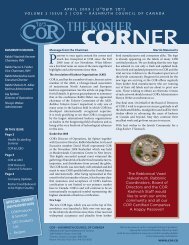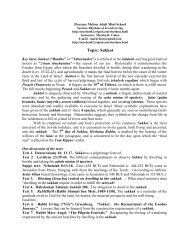The Religious Policy of Xerxes and the "Book of Esther"
The Religious Policy of Xerxes and the "Book of Esther"
The Religious Policy of Xerxes and the "Book of Esther"
Create successful ePaper yourself
Turn your PDF publications into a flip-book with our unique Google optimized e-Paper software.
XERXES AND THE BOOK OF ESTHER-LITTMAN<br />
I5I<br />
Agagite to mean descendent <strong>of</strong> Agag, king <strong>of</strong> <strong>the</strong> Amalekites,<br />
who were implacable enemies <strong>of</strong> Israel.23 Lewy maintains that<br />
pouyaoZo derives from <strong>the</strong> Persian word baga (god). While this<br />
derivation is not outside <strong>the</strong> realm <strong>of</strong> possibility, it seems much<br />
more likely that pouycaco& derives from povs (bull) <strong>and</strong> yaoo<br />
(to exult) <strong>and</strong> means a bully, braggart or monster. It is used<br />
almost exclusively as a term <strong>of</strong> reproach (Cf. Iliad 13.824 <strong>and</strong><br />
Odyssey I8.79 <strong>and</strong> Plutarch Quaes. Gr. 299B). In ix 24 <strong>and</strong><br />
E Io instead <strong>of</strong> 3ouyocLoq we find <strong>the</strong> word "Macedonian"<br />
which for <strong>the</strong> Greek reader would have <strong>the</strong> same connotation<br />
as Agagite for <strong>the</strong> Hebrew. Thus <strong>the</strong> Greek translator <strong>of</strong><br />
Es<strong>the</strong>r modernized <strong>the</strong> arcane term Agagite into PouyooqS, a<br />
form which would have meaning for <strong>the</strong> Greek speaking Jew.<br />
If, however, Lewy is correct in deriving pouyoaZo from baga,<br />
<strong>the</strong> case for <strong>the</strong> identification <strong>of</strong> pouyocLo; with a worshipper<br />
<strong>of</strong> Mithra is tenuous at best. <strong>The</strong>re are no o<strong>the</strong>r passages<br />
where <strong>the</strong> word has this meaning. As Lewy points out,24 <strong>the</strong><br />
term baga in <strong>the</strong> inscription <strong>of</strong> Darius denotes I. Ahuramazda<br />
"<strong>the</strong> greatest <strong>of</strong> <strong>the</strong> bagas" 2. deities <strong>of</strong> <strong>the</strong> Persian clans<br />
3. non-Persian gods. Lewy continues that in o<strong>the</strong>r usages it<br />
can mean "god par excellence" that is Mithra. Given this range<br />
<strong>of</strong> possibilities, Lewy rejects <strong>the</strong> fact that baga can refer to<br />
Ahuramazda on <strong>the</strong> grounds that both in <strong>the</strong> Elephantine<br />
papyri <strong>and</strong> in an inscription from Persepolis, a worshipper<br />
<strong>of</strong> Ahuramazda is referred to as t"trmt "worshipper <strong>of</strong> Mazda".<br />
Given our general ignorance <strong>of</strong> old Persian <strong>and</strong> <strong>the</strong> fact that<br />
<strong>the</strong> Greek versions <strong>of</strong> Es<strong>the</strong>r are many hundreds <strong>of</strong> years later<br />
than <strong>the</strong> Elephantine papyri <strong>and</strong> <strong>the</strong> inscription from Persepolis,<br />
it seems illogical to reject <strong>the</strong> possibility that ouyo&os<br />
refers to a follower <strong>of</strong> Ahuramazda because a follower <strong>of</strong><br />
Ahuramazda in two instances is referred to as nrTtm in favor<br />
<strong>of</strong> a connection with Mithra, when <strong>the</strong>re is no attestation <strong>of</strong><br />
its meaning "worshipper <strong>of</strong> Mithra" <strong>and</strong> very little evidence<br />
that baga can regularly refer to Mithra. I do not mean here<br />
23<br />
24<br />
Moore, op. cit., 35-36.<br />
Lewy, op. cit., I34-5.





